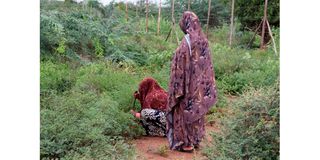Tana River girls still using rags during menses

A woman monitors as her daughter digs a hole for her menses in the bushes in Makutano Village, Tana River County. Most girls in the county are using rags due to a lack of sanitary pads in school and at home.
What you need to know:
- A a shortage of sanitary pads in schools and homes has seen Tana River girls turn to rags.
- Period talks are taboo, most girls only learn about menstrual hygiene at school, only where teachers are females from a different community.
- Girls in the county lose more than 600 hours of study time as they stay home during their menstrual cycle.
Most girls in Tana River County are still using rags and pieces of mattresses during their menstrual cycle.
This is a result of a shortage of sanitary pads in schools and homes, with the most affected being girls from herder communities in flanked areas of the county.
Amina Hussein, 15, from Lakole notes that her plight in the forgotten village is only known to herself, and some of her friends.
The teenager who decided to abandon her village to live with a relative to access a better life in the township at Kalkacha Village, recounts how difficult life is in the village flanked by civilization.
"It is a conversation that I can only have with my friends and relatives, our parents do not want to engage us on such topics since it is regarded as a taboo," she says.
Ms Hussein reveals that girls her age only learn about menstrual hygiene at school, only where teachers are females from a different community.
Water scarcity
With water scarcity rocking most of the villages, practicing menstrual hygiene is nearly impossible, hence leading to a period stigma and school dropouts.
"We walk for kilometres to get water for domestic use, but we can only go that far on weekends, our parents have to go every day, and there is no way, you will use that water to wash your rags, it will be a fight in that home," she says amid giggles.
With such experiences, Ms Hussein decries the high number of school dropouts in her former school as a result of the period stigma, with many of them opting for marriage.
She notes that her friends in some of the schools in the county get it even tougher as they have to be taught by a male teacher from their ethnic group, who finds it difficult to go into details.
She explains that the conversation on menstrual hygiene is only fun in township schools, and those near the township, but a hard talk in flanked areas.
"I have found where children learn and enjoy living, I don't ever wish to go back to the village until I am grown enough to help others overcome this monster of period stigma," she says.
Menstrual hygiene
As the World marked World Menstrual Hygiene Day last week, the experiences of children like Ms Hussein marked the conversation in the event in Tana River County.
Reproductive Health Officer Hawa Abdighafoor, says the demonization of the conversation on menstrual hygiene in communities is key to depression among children.
According to the doctor, most teenage pregnancies involving children in primary school narrow down to a lack of knowledge of the menstrual cycle and a struggle to be accepted.
"The communities have made the conversation look ugly and traumatic to the girls, so instead, the minors are seeking acceptance from whoever seems willing to offer, hence fall in the hands of sex pests," she says.
She notes that girls in the county lose more than 600 hours of study time as they stay home during their menstrual cycle due to lack of sanitary towels, hence affecting their education.
The reproductive health officer, however, advocates for a robust conversation and campaign against period stigma and menstrual trauma across the county through a joint initiative.
According to Menstrual Hygiene Ambassador Milcah Hadida of the Kenya Red Cross Society, period stigma is a monster that will take more than a day's event to bring down.
School dropouts
Ms Hadida notes that Tana River County leaders have ignored the girl child, hence has to guesswork towards her survival.
"This conversation has been with us for long, but the reaction from leaders is very discouraging as it does not focus on improving the situation, they have left it to organizations," she says.
Ms Hadida wishes the county administration and other leaders can develop a menstrual hygiene policy, allocate a budget for counselling stigmatized children, train them on menstrual hygiene and return the dropouts to school.
Nevertheless, some organizations are championing the conversation on period stigma and offering help to the victims. Among them are Groots Kenya, Brighter Society of Kenya, and Kenya Red Cross Society.





